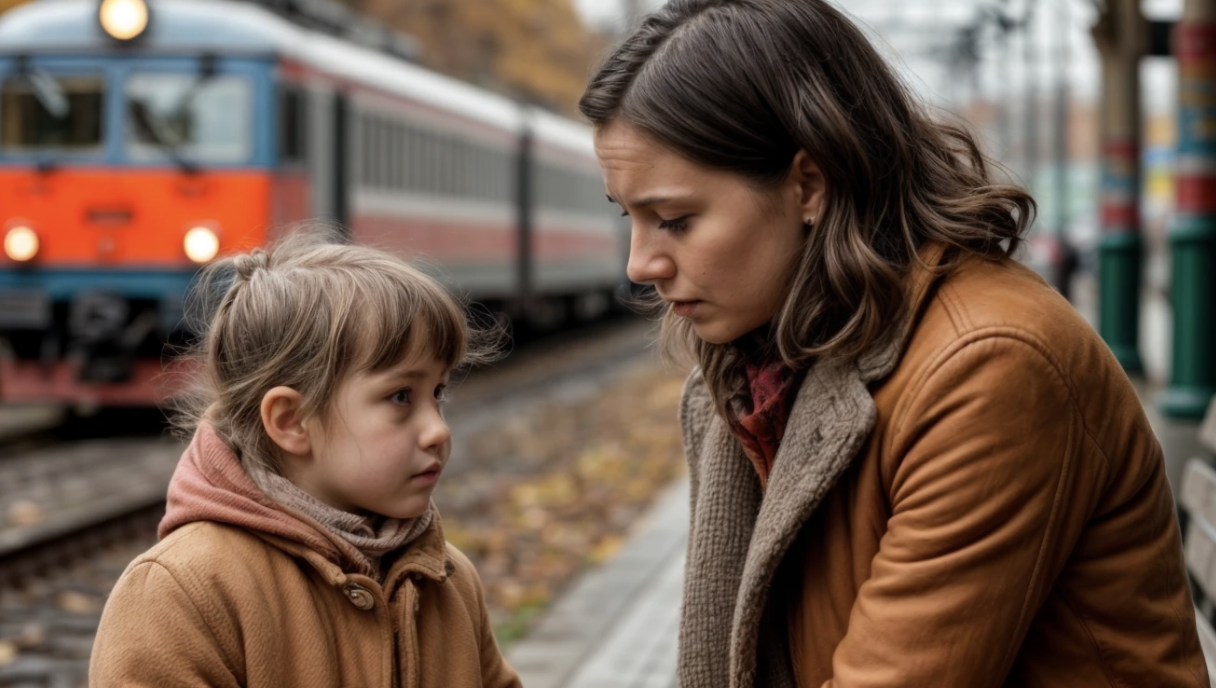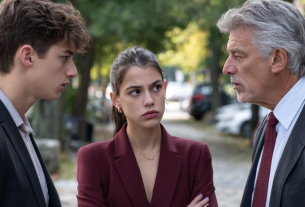A draft cut straight through as Irina walked through the empty waiting hall of a provincial train station. She wrapped her four-year-old daughter more tightly in a scarf. Katya, pressed against her mother, curled up on the hard bench, her breath settling in the cold air as tiny clouds of vapor. Outside the dusty windows, a snowstorm raged, pelting the glass with icy hail. Everything beyond the gloomy hall seemed foreign, hostile, and mercilessly cold.
In an old backpack—their only possession—lay the last loaf of bread and a few crumpled bills. There was enough money for one ticket to the nearest station, but where to go? Nobody was waiting for them anywhere. Irina broke off the largest piece for her daughter and left herself only a dry crust. She had no appetite; a bitterness of despair filled her mouth. Just a few days ago, at least they had a roof over their heads—shaky, but still. And now—only this icy bench and the wind’s howl outside the window.
Irina absentmindedly stared at the dirty glass when a swirl of snowflakes and the dim light of the street lamps suddenly took on familiar shapes. A woman passed by the window—thin, gray-haired, bent against the wind’s force. It was Margarita Andreyevna… her former mother-in-law. “It’s just my imagination,” Irina whispered, closing her eyes. “Hunger and exhaustion. A hallucination.”
But it couldn’t be a trick of the mind. Denis, her ex-husband, had long ago sent the woman who raised him to a nursing home. He was always quick to get rid of those who were weak. After the divorce, all relatives turned away from Irina as if she were leprous. Only Margarita Andreyevna continued to help: sometimes bringing milk, sometimes warm clothes for Katya, or simply hugging and saying kind words. Her involvement was a thin thread that kept Irina connected to humanity.
Now the image of this woman appeared like a vision, a ghost from a lost past. Memory revived the scene of the last humiliation: Irina, exhausted, kneeling and scrubbing the floor in a wealthy woman’s apartment. Larisa—cold, assured in her superiority—inspected the work with disdain:
“Dirty. Are you blind? I won’t pay for this.”
“Please… I have a child,” Irina pleaded, losing her last strength.
“Everyone has problems,” the woman cut her off. “Igor! See her out.”
Her son came out from another room—tall, stooped, with an empty look. Without a word, he took Irina’s hand and nearly pushed her out the door. “Pathetic weakling,” flashed through her mind. “Sitting on mommy’s neck and can’t even say ‘no.’”
The door slammed. She was left in the dark stairwell, empty-handed and with an icy emptiness inside.
Turning to neighbors for help, Irina faced indifference. Some looked away; others advised her to return to her ex-husband. But the thought of Denis terrified her—his drunken tantrums, threats, wild glare… No, asking him for help was like throwing herself into the arms of a predator.
Behind her back, people were already gossiping: “Give the girl to an orphanage. At least they’ll feed and clothe her. Maybe she’ll be better off there…”
Those words hit harder than any slap. Better off without a mother? Irina lifted the sleeping Katya, threw the backpack over her shoulder, and stepped into the icy night. The station was their only refuge.
Sitting on the cold bench, holding her daughter, Irina wondered why such a huge country had no shelters for mothers with children left homeless. Why were people like Larisa—who had everything—so cruel to those who had nothing? Isn’t motherhood, this hard and selfless work, worth something?
Her thoughts were interrupted by the voice of the duty policeman—a tired, gray-eyed man named Semyon:
“What are you sitting here for? You can’t spend the night here.”
“Nowhere to go,” Irina answered quietly. “The child will freeze.”
The man was silent for a moment, sighed, and left. About ten minutes later, he returned, handing her a bag. Inside were warm potato pies and a bottle of kefir. While Irina gratefully accepted the food, he quietly slipped a crumpled bill into her pocket.
She pretended not to notice. She broke a pie—giving most of it to the now-awake Katya. “Sometimes the warmest words and help come not from relatives, but from strangers,” Irina thought, watching the policeman walk away. He stepped aside but didn’t leave completely—guarding them with his presence from intrusive passersby. This unassuming man had become their invisible guardian angel on that long, icy night.
Early in the morning, as the station began to wake, someone gently shook Irina’s shoulder. She opened her eyes—standing before her was the woman she had yesterday dismissed as a hallucination.
“Irochka? Katyusha? How did you end up here?” Margarita Andreyevna’s voice mixed surprise and pain.
They hugged. Irina, who had held her pain and tears inside for many days, couldn’t hold back—bitter tears streamed down her face. Between sobs, they began to share their stories. It turned out Denis had indeed sent Margarita Andreyevna to the nursing home, declaring her incompetent to seize the apartment. Only thanks to an old friend, Valentina Semenovna, was she able to leave. Now they were heading to her—to another city where they wanted to start anew.
“How did you get involved with that man, Irochka?” Margarita Andreyevna whispered, gently stroking her hair.
Irina thought back: the orphanage, loneliness, fear of each new day. Denis seemed like support, salvation, a chance to find a family. She longed for love, warmth, care… When Katya was born, she was sure it was true happiness. How wrong she was…
Their reflection was interrupted by an energetic woman of about sixty, with a bright scarf on her head and lively eyes. She approached with a kind smile.
“Well, Margo, found your own? I told you—the heart doesn’t lie!”
It was Valentina Semenovna. She warmly greeted Irina and Katya as if she had known them for a long time.
“Get ready, girls. You’ll come with us. There’s enough room for everyone. And your problems—well, those are my problems now. I have connections, you know, so good even a minister wouldn’t be ashamed to call!” She winked. “By the way, Semyon was on duty here today just for you. He’s my nephew, and he wouldn’t let anyone harm you.”
Semyon, the policeman who had helped them the night before, smiled shyly and carefully took their backpack. The train moved, carrying them away from cold, fear, and hopelessness. Ahead was the unknown—but for the first time, it didn’t frighten them—it gave hope.
Valentina Semenovna’s apartment was spacious and cozy. She welcomed them like family. The energy of this woman was striking—she made a plan of action in just one day. The next morning, a legal machine started working, helping Irina gather documents for a support program for orphanage graduates and placed her on the waiting list for social housing.
Several months later, news came about Denis. After Margarita Andreyevna regained her rights, he lost control completely. He drank more than before, and one day his body was found on the street—either from beatings or cold. Irina learned this with cold indifference. That person had long ceased to exist for her.
Valentina helped Margarita Andreyevna sue for her rightful share of the property, and then the women honestly divided everything, some of it signed over to the granddaughter—Katya.
Gradually life settled into a routine. Margarita and Irina became a real family. They ran the household together, cared for the child, supported each other. Shared pain and joy bound them closer than blood ties.
Semyon began visiting often. He brought toys for Katya, played with her, and looked at Irina with warmth he no longer hid. Valentina, watching them, teased:
“Well, well, Irisha, fate has sent you a helper—a golden person. Don’t let him go!”
Irina blushed but felt something bright and new awakening in her heart, torn by troubles.
A little more than a year passed. A year that turned their lives around. Irina got a small but cozy apartment. Margarita Andreyevna sold her share and bought a place nearby to always be close. Katya started at a new kindergarten and quickly made friends.
One of the first autumn evenings, Semyon proposed to Irina. The wedding was modest—only the closest friends and family. But on that day, it seemed the whole world was warmed by light and love. Margarita Andreyevna and Valentina Semenovna, hiding tears, watched the newlyweds with motherly pride. And the happiest at the celebration was Katya—twirling in a white dress, telling everyone, “I have the best dad in the world now!”
One evening, Irina overheard her daughter telling a friend: “When I grow up, I’ll be a lawyer. Like Aunt Valya. I’ll help those in trouble.”
Margarita Andreyevna and Valentina Semenovna were already making plans—discussing how to best set up the nursery in Irina’s apartment. They were sure a new baby would soon appear in the big, loving family.
One evening, over a cup of tea, when Katya was already asleep, they all gathered in the kitchen. Irina, looking at her rescuers, said:
“I realized one thing. True kindness makes no noise and asks for no thanks. It just comes at the moment when it seems nothing can help anymore.”
They sat in silence, each thinking their own thoughts. About how strangely and wonderfully human destinies intertwine, how from pain, fear, and despair is born something new, so precious and fragile—happiness.


